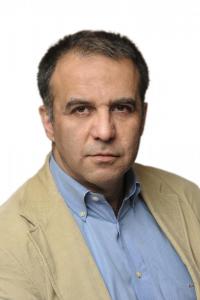George Z. Mentis, PhD
- Professor of Pathology and Cell Biology (in Neurology)

Overview
George Mentis received his BSc in Physiology and a MSc in Neurological Science from University College London (UCL) and his PhD in Neuroscience from Imperial College London in the UK. He then worked initially as a postdoctoral fellow and subsquently as a staff scientist at NINDS in the NIH in Bethesda Maryland. At the beginning of 2010 he was recruited as an Assistant Professor to the Center of Motor Neuron Biology and Disease in the Department of Pathology and Cell Biology at Columbia University.
Laboratory website: Mentis Lab
Academic Appointments
- Professor of Pathology and Cell Biology (in Neurology)
Gender
- Male
Credentials & Experience
Education & Training
- PhD, Neuroscience, Imperial College University of London (United Kingdom)
Honors & Awards
- 2006 NIH FARE Award (Fellows Award for Research Excellence).
- 2010 1st Audrey Lewis Young Investigator Award (from Families of Spinal Muscular Atrophy - FSMA).
Research
Spinal motor neurons serve as mediators of motor output from the spinal cord and their activity is modulated by a network of spinal neurons, known as the central pattern generator, responsible for the coordinated motor output that comprises locomotion. Locomotion and the spinal network that generates the required patterns of muscle activity is an appealing system for studying how the nervous system produces complex behavior. In our laboratory, we have taken a developmental approach to the study of locomotion in the neonatal mouse. To understand the role of spinal motor neurons in normal motor behavior, we must first depict the local circuitry in which they function. These same functional connections are undoubtedly perturbed in diseased states such as the neurodegenerative motor neuron disorder, Spinal Muscular Atrophy (SMA) and must be understood in the context of disease models if function is to be protected or restored. Advances in our understanding of the genetic basis of heritable diseases such as SMA and ALS have also made it possible to model these disorders in mice. We are using these models to elucidate the synaptic, cellular and neuronal circuit pathophysiology in motor neuron disorders using physiological, anatomical, behavioral and optogenetic approaches.
Welcome to Mentis Lab.